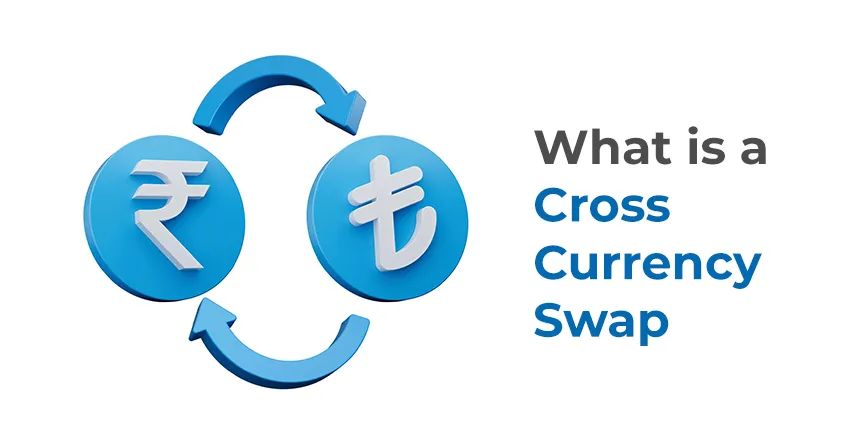A cross-currency swap refers to an agreement between two parties for exchanging currencies. This swap involves periodic interest payments and an exchange of equal principal amounts at the beginning and end of the swap duration. Typically used to secure exchange rates for specific periods, these swaps occur between different currencies and can be modified by the involved parties within the over-the-counter (OTC) market. Unlike for speculative purposes, a cross-currency swap primarily aims to fix an exchange rate on a set currency amount with a benchmarked interest rate. For a detailed insight into the meaning and definition of cross-currency swaps, continue reading this article.
Table of Contents
Understanding Cross-Currency Swap Meaning
The exchange of cash flows in two different currencies is part of a cross-currency swap or CCS.
- It is usually used to raise funds on a market where the corporation has comparative advantages in order to achieve its portfolio in various currencies of its choice at lower prices than if it had access directly to another currency’s markets.
- The exchange of two currencies and interest rates relevant to those two currencies are involved in these types of swaps.
- These instruments are used to hedge risks arising from interest and exchange rate fluctuations because of their specific nature.
- Cross-currency swaps are also known as dual-currency swaps.
- Cross-currency swaps involve exchanges of principal and interest payments between two currencies at the beginning, compared to ordinary foreign exchange swaps. For example, one party could pay fixed interest in US Dollars while receiving variable interest in Euros. These swaps are designed to give parties access to foreign currency but do not require them to be directly involved in the exchange of currencies.
How Does Cross-Currency Swaps Work?
The comparative advantages of borrowing are used as a basis for cross-currency swaps.
- The borrowers can take the lowest interest rates on their domestic currency loans, but they will have to pay a higher rate of borrowing in foreign currencies.
- Therefore, the exchange of currencies can be performed by determining a counterparty from another country capable of borrowing at its advantageous rate.
- Simultaneously, one of the two parties borrows at its domestic interest rate and immediately swaps debt obligations with the other.
Examples of Cross-Currency Swaps
Applications of cross-currency swaps are found in the following sectors.
1. Corporate Finance
Multinational companies are using exchange rate swaps to manage currency risk associated with international operations, financing projects in foreign currencies, or conversion of foreign earnings into their home currency.
2. Banking Sector
Financial institutions use cross-currency swaps to access foreign exchange for
borrowing purposes, hedge funding, or optimise their balance sheets.
3. Government Finance
In order to manage their debt portfolios, secure favourable lending rates in foreign currencies, or mitigate the risks of foreign exchange risk associated with external currency-denominated debt, governments can use cross swaps.
Advantages of Cross-Currency Swaps
Cross-currency swaps offer several benefits to market participants, as mentioned below.
1. Hedging the Risk of Exchange Rate Fluctuations
Companies can protect their financial position and reduce uncertainty by hedging the risk of exchange rate fluctuations through the use of a cross-currency swap.
2. Reducing Funding Costs
In order to tap into markets with lower borrowing costs, undertakings can benefit from currency swaps and thereby reduce their overall financing costs.
3. Strengthening Portfolio Diversification
Swaps allow investors to increase diversification in their portfolios between currencies and reduce the risk of concentration, which can lead to a better risk-adjusted return.
4. Accessing Foreign Currency
For businesses to finance international activities or investments without having to convert directly, cross-currency swaps provide a means of obtaining foreign currency.
Risks and Challenges of Cross-Currency Swaps
Several possible risks are explained below.
1. Counterparty Risk
The counterparty risks are similar to those inherent in any derivative instrument and entail a risk that one party may be unable to meet its obligations, resulting in losses for the counterparty.
2. Liquidity Risk
The ease of execution and withdrawal of swap positions can be affected by the availability of counterparties and liquidity across currency swap markets.
3. Basis Risks
If the interest rate or currency values of an exchanged currency are not completely aligned with one another, which could result in unforeseen financial results, basis risk arises.
4. Interest Rate Risk
The change in interest rates can have an impact on the valuation and cash flows of credit default swaps (CDS), which may also introduce new risks to those involved.
Uses of Cross-Currency Swaps
- Less expensive debt can be bought with currency swaps. This is done by obtaining the best available rate of any currency and then exchanging it for the currency of your choice with back-to-back loans.
- Currency swaps can provide an alternative to fluctuations in foreign exchange rates. It also mitigates the risk that institutions will be exposed to sizable movements of currency prices, which could have a major impact on business profitability and costs in parts of their operations likely to be affected by external markets.
- Countries can use currency swaps to protect themselves in the event of an economic crisis. Currency swaps provide access to income for countries by allowing another country to lend its currency.
Conclusion
Cross-currency swaps have emerged as a vital financial tool for mitigating currency risk, accessing foreign currencies, and optimising funding expenses. Their pivotal role in finance is attributed to their ability to streamline exchanges efficiently and offer hedging solutions. As the global landscape grows more interconnected, comprehending and adeptly utilising cross-currency swaps will be paramount for businesses and investors to navigate the intricacies of international finance. Foraying into currency trading can be initiated through trading platforms such as Share India.

